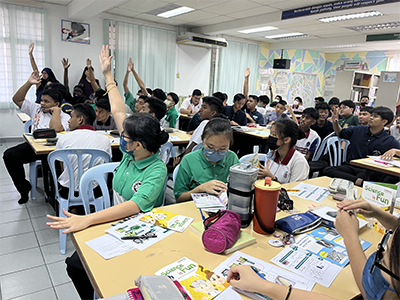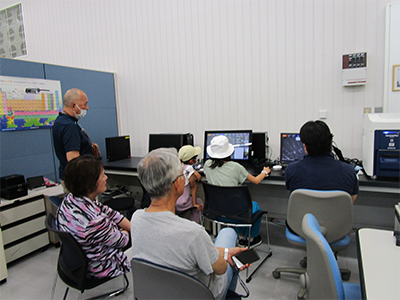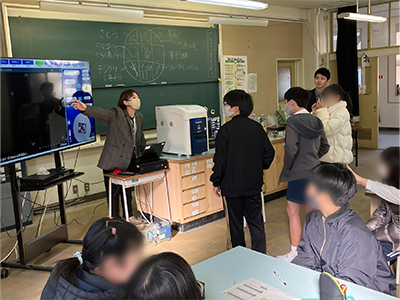Human Resource Development
Social Background
One social issue that developed countries have in common is a decline in awareness of the value of studying sciences. Increasing the opportunities for children to take an interest in the sciences, and having children feel more familiar with the sciences, will help improve scientific literacy and contribute to the development of science and technology, and this will be essential for the development of human resources to carry on in fields across the range of science and technology and for the realization of a sustainable society. The fourth goal of the SDGs, which raise common issues for the world community, is to ensure inclusive and equitable quality education and promote lifelong learning opportunities for all.
Our basic principle is "value creation through high-tech solutions," and the Group, which has a business foundation of science and technology, will contribute to professional education and the development of society by conducting science education leveraging our technology and products such as physical and chemical apparatus.
Initiatives
1. Support for Science Education Activities Through Electron Microscopes
Our Group is applying the core technologies in our areas of strength in Observation, Measurement, and Analysis to resolve a variety of issues in society. In our activities to support science education, we make advantageous use of tabletop electron microscopes, which are products of our Group, to give students the experience of micro-scale observation of familiar objects. Our purpose is to stimulate interest in science and technology among children, provide science education that allows students to experience advanced technology, and contribute to the development of human resources in the sciences to carry on in science and technology. For those reasons we are cooperating in a variety of events, including educational outreach courses at elementary and junior high schools and displays at science museums, special exhibitions, and so on. In addition to educational outreach sessions in which we bring equipment directly into the classroom, we are also devoting resources to online science education support activities such as outreach sessions with tabletop electron microscope that makes use of remote functionality.
These activities are being carried out at Group companies both in Japan and overseas.
Hitachi High-Tech Support engages in activities to support science education for special-needs schools. In FY2023, the company conducted outreach classes using tabletop electron microscopes at Tokyo Metropolitan Eifuku Gakuen and Tokyo Metropolitan Mizumoto Koai Gakuen. It also took steps to bring about exchange with students, such as having graduates who work at the company hold classes, having them give explanations of what they do at work, and so on. Going forward, the company will continue developing activities to support science education and build relationships of trust with stakeholders.
At Hitachi High-Tech Fielding, we engage in activities to support science education at local elementary schools. In FY2023, outreach classes were held at Sendai Municipal Shichigo Elementary School, Shinjuku Municipal Hanazono Elementary School, and Toyonaka Municipal Kitaoka Elementary School. Going forward, the company will value connections with local communities while promoting science education support activities for children nationwide.
Outside Japan, Hitachi High-Tech America continued to collaborate with partners in North America, South America, Canada, and Australia to further improve the content of their activities. Group companies in Asia and the ASEAN region held outreach classes at schools for Japanese students and local elementary and junior high schools in China, Taiwan and Singapore. In addition, Hitachi High-Tech Indonesia conducted its first outreach classes for the local secondary school, SMK Cochrane.
Looking ahead, we will build cooperative ties with various relevant organizations and strategically implement our programs as we look to firmly establish our activities in all regions. Thereby contributing to the development of the next generation of scientific researchers.




